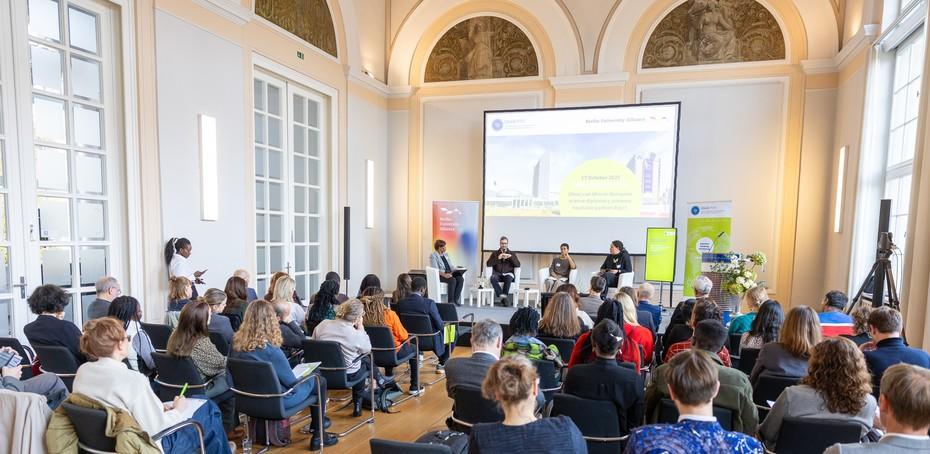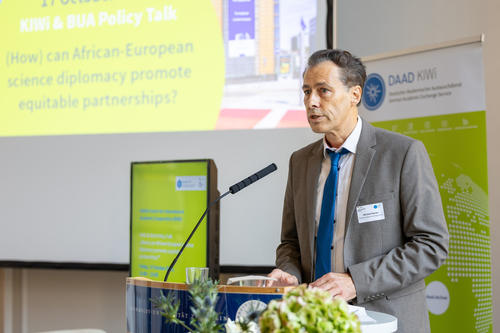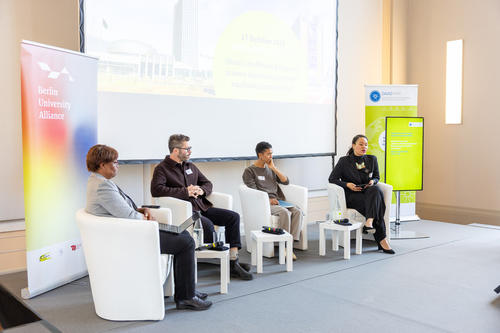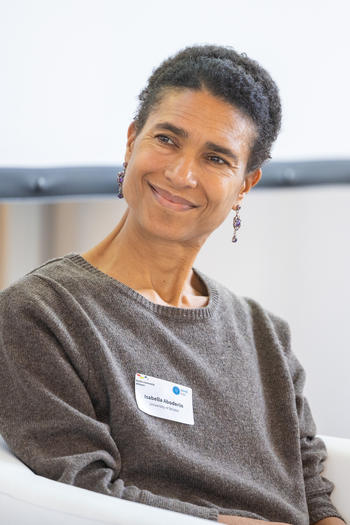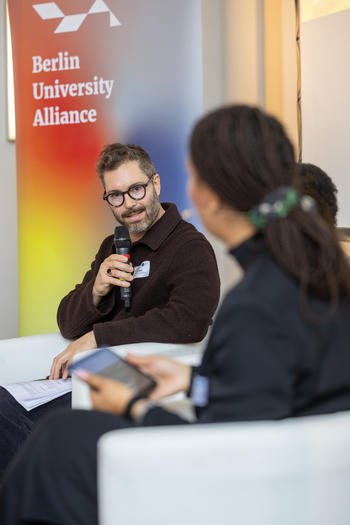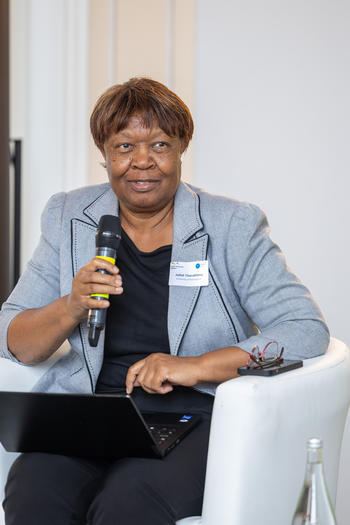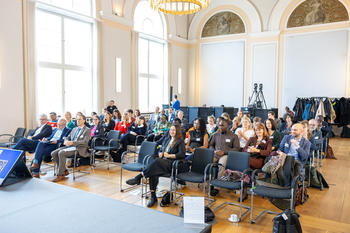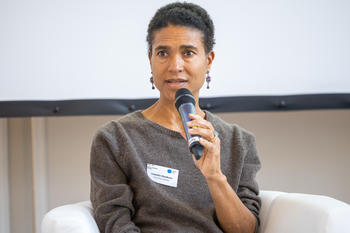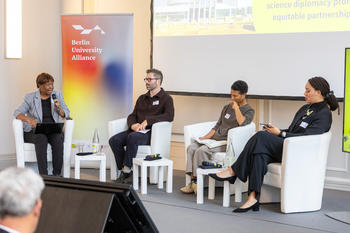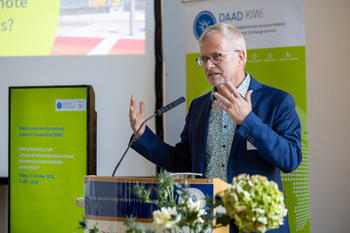DAAD KIWi & BUA Policy Talk - “(How) can African-European science diplomacy promote equitable partnerships?”
The Panelists discussed about how research partnerships between African and European scientists can be established in a truly equitable way, what framework conditions hinder such collaboration and how and why a transformative effect for science and our future emanates from its implementation.
On October 17th 2025, the event took place at the Festsaal of the Humboldt Universität zu Berlin. Approximately 60 people took part in presence, a further 150 attended online.
Opening: Michael Harms, DAAD
“The world is like a mask dancing. If you want to see it well, you do not stand in one place”
With this quote from Nigerian writer and thinker Chinua Achebe, Dr. Michael Harms, Deputy Secretary General of the DAAD, opened the event – the theme was taken up at multiple occasions in the discussion. It points to the importance of equitable partnerships for understanding the world in all its richness and complexity, to the power of perspective-taking, the necessity of physical and mental mobility and the value of transformation. Facing the global challenges, it is not a matter of choice but of mutual interest that Africa and Europe maintain, strengthen, and diversify their scientific relations, relations that are central to building the knowledge, trust and capacity required. Our future will be shaped, by how we choose to work together. Fundamental for such collaboration is genuine openness to learning from the other, to allow for both, the European and the African partner, to be transformed by the experiences made for example in the mobility schemes and programs the DAAD offers. In recent years, the DAAD has consciously sought to further co-owned equitable partnerships through its activities. As the landscape of global research cooperation is shifting, for Europe to remain a relevant and trusted partner, it must adopt a more proactive, flexible and responsive approach grounded in its democratic values and a commitment to shared vision, long-term engagement, and genuine co-creation. Together, we must safeguard academic freedom, knowledge security, and institutional autonomy. It means that we must oppose political interference in academic spaces, ensure the integrity of research environments, and prevent the misuse of scientific knowledge in ways that divide or exclude. Dr. Hrams interpreted the quote as a call to action to keep moving intellectually, to keep shifting our institutional perspective, and to keep learning from each other. Not only across borders, but across histories, cultures, and structures. For mutual understanding, resilience and building trust.
The Panel Discussion
The Panel included Professor Dr. Isabella Aboderin, chair in Africa research and partnerships at the University of Bristol and director of the Perivoli Africa Research Institute, also known as PARC, one of the driving personalities for the “Africa Charter for Transformative Research Collaborations”; Professor Dr. Boris Heinz a professor of community energy and adaptation to climate change at TU Berlin, who coordinates several large EU projects with African partners; and Professor Dr. Julia Thondhlana, a professor of international education and development at the University of Nottingham, UK, and Coordinator of the Association of African Universities (AAU) Europe regional office. A fourth speaker, Prof. Peter Simatei from Kenia could – case in point – not join because he received his Visa too late.
Moderator Yolanda Svetlana Rother opened with an inquiry into a deeper understanding of what the terms “equitability” and “equitable partnerships” actually entails and why the discussion is so timely and important.
We all seem to intuitively grasp what equity means, Isabella Aboderin pointed out, and that so much good will is palpable such that the term “equitable partnerships” is now used so frequently, it risks becoming perfunctory, a buzzword or even a fuzz-word. But much more thinking and discussion is needed to make clear, what it actually entails – and what it is actually for. In a context of geopolitical developments, when the global economic context is changing societal climates and a gradual push back against value-based perspectives and value-based action seems to be building, the case for equity needs to be emphasized. It is not only about equitable access to opportunities for or rewards from knowledge production. It is also about the very kinds of knowledge that are produced.
Considering the global poly-crises of globalized capitalism, underpinned by the currently dominant euro-modern, western logic and ways of thinking about how the world works and how it should work, there is a need for alternatives. We need alternative logics about how the world works and how it needs to work. Equity is also about making space for knowledge systems, knowledges, knowledge frameworks that have been marginalized so far. Equitable research partnership is not about Africa, it is about our collective future!
Boris Heinz highlighted and substantiated the tension between meanwhile somewhat agreed upon ideals and the actual application of such principles in research collaborations with African Partners, where he tries to apply these ideals of equitable partnership in an often messy reality. The “what” is often given by such higher level policy considerations and funding conditions, but the “how” of how to translate this into practice is usually neglected. How to bring together partners from various countries, with different starting points, different capacities to collaborate at and with the local conditions that are low resource contexts in remote areas. For example, in rural displacement areas, where at times the lack of light in the night can have directly life-threatening consequences. How can research be conducted, that includes the perspective of those directly concerned, how can their perspectives be truly understood – and therefore solutions be developed that actually respond to local needs and therefore are adopted? Such “participatory action research”, or “citizen science” provides valuable insights, that can even feed back into diplomacy and strategic levels, but they are largely missing.
The barriers to equitable partnerships however also reside in the systems, the structures we are all existing in, Juliet Thondhlana pointed out. They can be institutional, national, even global. The most obvious for scientists is the funding architecture, that is mostly centralised in Europe. And while there is much change happening and African partners are meanwhile formally allowed for example to lead projects, eligibility criteria may re-enact the dependency-structures of the past, because unlike European partners, the research management support structures simply are not available in most African Universities to, for example, manage the funding. The capacity is simply not available. This is also underpinned by short term project cycles, as they do not permit for training in research management, even in the rare cases when the funding were available. African partners have to look to European partners to do what they cannot provide themselves.
Another ubiquitous barrier is the definition of excellence, which usually is defined by Europeans and funders. African scientist respond to European standards, but that actually marginalizes especially indigenous and context-driven research. Because, if I want to go and study a group of people out there in the rural areas - is the funder going to see that as a viable project? So research is defined by European actors through the definition of excellence. Another very practical example is the immigration/visa-processes – as evidenced by an absent speaker on the panel, but also e.g. insurance issues.
But a lot of movement is happening and there is growing African research leadership and networks, there are opportunities and the space is opening up. There are a lot of new funding windows, multi-donor initiatives that favour the global south, there is digital collaboration enabling scholars and we have a lot of discussions around policy, and diaspora engagement.
It is a weird kind of moment actually, Boris Heinz explained: while on the higher level we have this shining strategic willingness and the agendas that direct the way, the funding level is still catching up with rigid eligibility criteria. And at the project level we are trying to collaborate, we are trying to be participatory. But when for example we need more time, to establish trust for example, to exchange our different angles to the mask - and the funder requested this - but if we deliver a report that takes more time or resources, then we are basically in trouble.
But there are promising developments. For example, there are funds where each party applies to their home country donor agency – then the issue of who holds the power of the budget for example is decentralized. But it's far too little, we only see first steps there.
Further to these funding regimes - what funders ask for, what they want, what they allow for-, Isabella Aboderin specified, and underlying them are institutional level policies that define what is rewarded and what is incentivized in the work that scholars do. Starting from promotion criteria - it is not time spent on participatory, equitable, transformative research collaborations that further a career, it is outputs preferably where we are first or leading authors. So these institutional incentive structures also need to change to really enable and yes incentivize a different way of collaborating.
And these tangible, relatively easy to identify structures are complemented, and also underpinned, by even more invisible structures that reside in our own brains, resulting from how they have been shaped by working in the very same structures.
However, a certain degree of control still resides in the liberty of research partners to define themselves how they want to collaborate. In any given project, Juliet Thondhlana indicates, a number of leadership roles can be defined according to the capacities or the interests of the partners or responding to opportunities. Partners can decide to conceptualise together, define research questions jointly, etc. Much of the collaborative practices are also more about respect and communication and ultimately trust, that can be established with shared agency. And also by recognising the input each of the partners provide. For example, Universities often provide the percentage of funding they have to contribute to a project in kind and not in cash. The same is often not recognised in African partners, that do provide locations, transport and alike. Acknowledging such input will also give African scientists more voice and take them further out of the recipient’s corner. Also, the access to and insights from in the communities we work in should be recognised as joint intellectual property.
Boris Heinz took this thought of joint intellectual property up to clarify, that the definition of what is needed, what are the priorities and what makes sense in a location should be made by the local people concerned. Solutions then need to respond to these needs and priorities. Such a collaborational process – or design-process will contribute to preventing the lack of uptake experienced so often in projects of the past decades. This immediate working level is the first where new forms of collaborating need to be practiced, implemented. The second level would be the departments (Lehrstuhl), because to enable such new forms of collaborating, longterm-partnerships are extremely helpful. When trust between partners is already established, then, once a funding opportunity presents itself, the partnership needs not start from scratch. The next level are the universities, or the Berlin University Alliance level, that provide an enabling environment, not only for mobilities and cooperation agreements, but also by for example adopting the “Africa Charter for Transformative Research Collaborations”. The project level is however the one, that is most in need of further development.
Further to this bottom-up approach that strives for practically developing and supporting that African European partnerships become more equitable, there is a need for a concerted effort to actually try and change the structures, change the policy architectures both at institutional level but also at the higher education sector level, Isabella Aboderin stressed. It's critical that we spend time and engage ever growing communities of scholars and others to be very clear about what we mean when we say equitable partnerships. And we need to unpack the different levels that are involved, and then systematically see where policy architecture, structures need to change to address those levels. Very often in the discourse around equity in research collaborations emphasis is placed on equality, mutuality but equity is something else. The goal of equity or equitability is about ensuring that countries or regions that are playing a marginal role in the global production of scientific knowledge begin to take their rightful place in that production of scientific knowledge. Because it is foundational for their place in the global political and economic hierarchy, and as such it underpins to a large extent some of the global inequalities that we see in terms of economic and other forms of well-being. Including the ability to invest in higher education and research. So, we really need to understand that this is a systems level matter at the end of the day. It's about power. It's about influence at the systems level. It's really important to take as a point of departure the systems level, and the Africa Charter with the analyses it is based on, is helpful in this respect. And then we need to unpack: well what does that mean? What does that translate into at the project level? Mostly the attention is on asymmetries in concrete collaboration arrangements: the division of labour, control of budgets, contracting, the overheads, all that, and the wide disparities in institutional resourcing and capabilities. Most of the debate really focuses on those. But there are layers of power imbalance underneath that, that give rise to the to the outer ones that we see. Power imbalance at very core, at the epistemic level. The knowledge frameworks and systems that are privileged that are dominant when we create new scientific knowledge together. The languages that we use to create new knowledge. Language is where knowledge is located. Whose language are you using to generate new knowledge to even define the problem that you want to interrogate? What theories and concepts and theoretical perspectives are you using to scaffold the generation of new knowledge? And we know that what we use is Eurocentric. It's not just about dissemination.
And then there is the development frame: In the UK much if not all of the support that's provided to collaborative research with Africa is framed as ODA, “overseas development assistance”- Africa is developing, global north is developed. That, for example, limits the areas that are deemed relevant for inquiry in Africa because other areas of inquiry don't fit within the particular global development frame of the day. We really need to unpack that and then see how can structures be adapted to support research collaborations that redress these multiple layers of power imbalance
The panel
African research also is often not recognized, not visible, Juliet Thondhlana replied to an inquiry about the risks emanating from not pursuing equitable partnerships. If their confidence in their work can be bolstered, they will be less amenable to undue influence that stems from recent geopolitical developments. Africa is highly diverse in its 54 countries, the AAU represents about 450 African Universities. And the role of the AAU is to bring experts from different regions together, to align work also with initiatives from the UNESCO, to spur collaboration. For example, AAU provides leadership training together with other nations. AAUs Europe Office like the other international offices, has the aim of developing international cooperation – and to further equitable collaboration.
One explicit danger in not pursuing equitable collaborative partnerships, especially in the realm of climate change and energy, Boris Heinz sees in the big risk emanating from mis-fitting solutions. The local perspective, of the needs, the requirements, the priorities and also the capacities - what is possible to generate in order to address a problem is often not really captured and taken up into research or implementation. The solution would be to bring the different capacities together. While Europe has a lot of capacities, we also lack a lot of capacities for example in community engagement, in frugal innovations, in how to collaborate and how to navigate complex social contexts. We need to bring together from many sides what we have in terms of capacities. This could also support the visibility of African research. But that means also, that some agency, some budget, some activities are given out of hand. In the end though, the energy solution or the health project outcome is more holistically grounded and we have a lower risk of producing something that is not fitting to what is needed. If you want to do something differently, then this should start at the project level because there it's actually feasible to pilot it, to show how it can work.
Conclusions: Herbert Grieshop, Berlin University Alliance
As final remarks of the day, Dr Herbert Grieshop, Director International Affairs at Freie Universität Berlin and representative of the BUA, pointed out, that the BCGE-Berlin Center for Global Engagement of the Berlin University Alliance works and wants to work exactly in this realm of equitable partnerships. The BUA is currently in its evaluation process and applying for a further seven years of funding, so there is hope that the BCGE can work on equitable partnerships in an even more prominent role in the coming funding phase. However, to achieve equitable partnerships, there have to be partnerships in the first place – so the collaboration with African partners needs to be increased. Projects should develop into partnerships that should grow into sustainable, possibly institutionalised partnerships ultimately. Albeit, there is the most interesting question of hierarchies among institutions that equally exist in Europe as well as in Africa – and how to deal with that. However, the discussion has shown a complex and mixed picture of much goodwill and progress and a multitude of challenges, and it depends on interpretation if one wishes to see the glass as half empty, or rather as half full.
The Berlin University Alliance has signed the Africa Charter for Transformative Research Collaborations on November 20, 2024, you can find further info here: https://www.berlin-university-alliance.de/en/commitments/international/bcge/_inhaltselemente/Africa-Charta/index.html
For further insights on the Africa Charta, you can listen to Episode 17 of our "Meridian podcast of the Berlin Center for Global Engagement": https://www.berlin-university-alliance.de/media/podcasts/meridian/index.html

